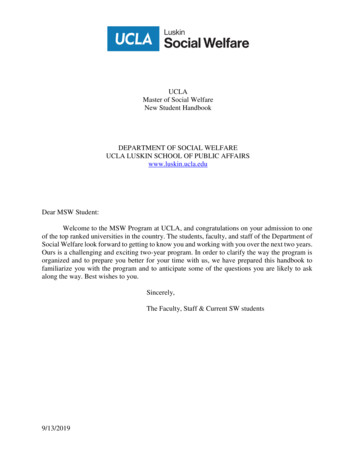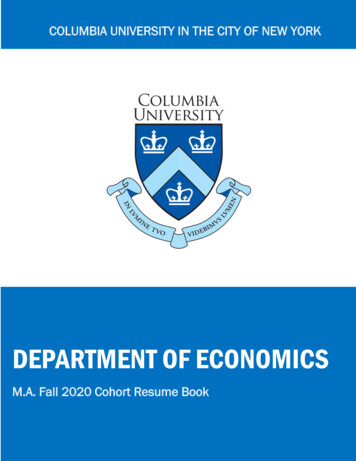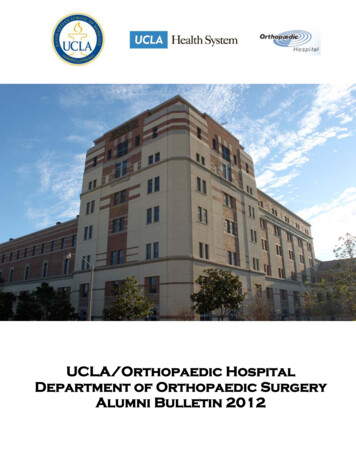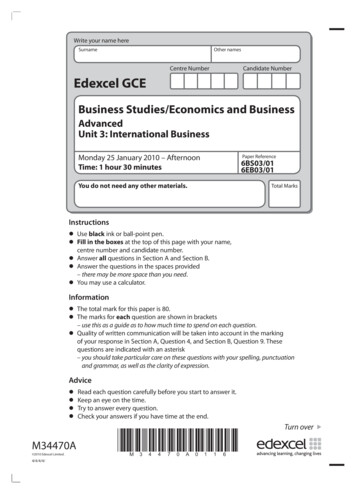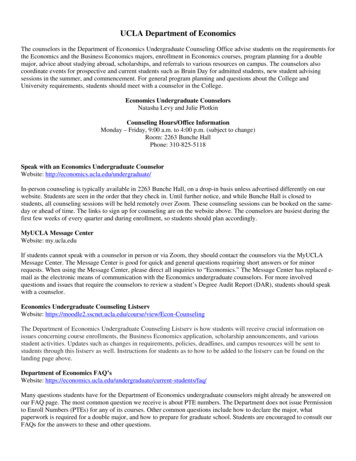
Transcription
UCLA Department of EconomicsThe counselors in the Department of Economics Undergraduate Counseling Office advise students on the requirements forthe Economics and the Business Economics majors, enrollment in Economics courses, program planning for a doublemajor, advice about studying abroad, scholarships, and referrals to various resources on campus. The counselors alsocoordinate events for prospective and current students such as Bruin Day for admitted students, new student advisingsessions in the summer, and commencement. For general program planning and questions about the College andUniversity requirements, students should meet with a counselor in the College.Economics Undergraduate CounselorsNatasha Levy and Julie PlotkinCounseling Hours/Office InformationMonday – Friday, 9:00 a.m. to 4:00 p.m. (subject to change)Room: 2263 Bunche HallPhone: 310-825-5118Speak with an Economics Undergraduate CounselorWebsite: http://economics.ucla.edu/undergraduate/In-person counseling is typically available in 2263 Bunche Hall, on a drop-in basis unless advertised differently on ourwebsite. Students are seen in the order that they check in. Until further notice, and while Bunche Hall is closed tostudents, all counseling sessions will be held remotely over Zoom. These counseling sessions can be booked on the sameday or ahead of time. The links to sign up for counseling are on the website above. The counselors are busiest during thefirst few weeks of every quarter and during enrollment, so students should plan accordingly.MyUCLA Message CenterWebsite: my.ucla.eduIf students cannot speak with a counselor in person or via Zoom, they should contact the counselors via the MyUCLAMessage Center. The Message Center is good for quick and general questions requiring short answers or for minorrequests. When using the Message Center, please direct all inquiries to “Economics.” The Message Center has replaced email as the electronic means of communication with the Economics undergraduate counselors. For more involvedquestions and issues that require the counselors to review a student’s Degree Audit Report (DAR), students should speakwith a counselor.Economics Undergraduate Counseling ListservWebsite: ounselingThe Department of Economics Undergraduate Counseling Listserv is how students will receive crucial information onissues concerning course enrollments, the Business Economics application, scholarship announcements, and variousstudent activities. Updates such as changes in requirements, policies, deadlines, and campus resources will be sent tostudents through this listserv as well. Instructions for students as to how to be added to the listserv can be found on thelanding page above.Department of Economics FAQ’sWebsite: tudents/faq/Many questions students have for the Department of Economics undergraduate counselors might already be answered onour FAQ page. The most common question we receive is about PTE numbers. The Department does not issue Permissionto Enroll Numbers (PTEs) for any of its courses. Other common questions include how to declare the major, whatpaperwork is required for a double major, and how to prepare for graduate school. Students are encouraged to consult ourFAQs for the answers to these and other questions.
Enrolling in Non-UCLA CoursesStudents who want to satisfy Economics or Business Economics major requirements at another domestic or internationalinstitution, while they are not enrolled as regular UCLA students during a regular quarter, should consult with aDepartment of Economics counselor prior to taking the courses. There are guidelines that dictate which non-UCLAcourses will be accepted for major credit (e.g., a maximum of three upper division major courses and no maximum onlower division courses; certain prerequisites, etc.). Students who are interested in studying abroad through the UCEducation Abroad Program (UCEAP) will discover which institutions are available to students studying economics byspeaking with an advisor in the UCLA International Education Office (IEO). UCEAP advisors are available to follow-upwith should you have additional questions about the programs themselves.InternshipsStudents are encouraged to do at least one internship during their time at UCLA. An opportunity to earn units by writingan economics research paper in conjunction with the internship is available with the two-unit course entitled Economics195A/Community or Corporate Internships in Economics. To be eligible to enroll in Economics 195A, a student must beofficially declared as Economics, Business Economics, or Mathematics/Economics, and must have Junior or SeniorStanding. The internship must be related to financial or economic analysis. To enroll in a 195 course under anotherdepartment that accommodates non-majors, please visit the UCLA Center for Community Learning office website atuei.ucla.edu/community-learning/Undergraduate ResearchWebsite: hass.ugresearch.ucla.edu/Students may wish to consider doing research with a faculty member and/or a Ph.D. student before graduation. To doresearch with a faculty member under Economics 199A, students must be officially declared as Economics, BusinessEconomics, or Mathematics/Economics, must have Junior or Senior Standing, and must have completed Economics 101,102, and, in some cases, 103/103L.Department of Economics ScholarshipsThe Department of Economics appreciates the generous contributions from our donors. The scholarship amounts rangefrom 3,000 to 5,000 each. The donors have individual criteria for each award, however, the following informationapplies to all awards: You must be officially declared as an Economics or Business Economics major. You must be a full-time UCLA student registered and enrolled for the full academic year.Financial Aid and Scholarships Office and the Scholarship Resource CenterWebsites: financialaid.ucla.edu and scholarshipcenter.ucla.eduUCLA is committed to helping students finance their education. The Financial Aid and Scholarships office and theScholarship Resource Center work closely with students who need financial assistance. A financial aid award generallyconsists of a combination of scholarships and grant money from UCLA and other sources, low-interest loans, and a workstudy job during the academic year.Summer Sessions at UCLAWebsite: economics.ucla.edu/summerThe Department of Economics offers a full schedule of courses each summer. Taking summer courses provides studentswith an opportunity to get ahead. All UCLA students qualify for in-state tuition.General Academic Counseling Contact InformationWebsite: neral academic counselors in the College and in the professional schools can help students determine how to fulfill GEand university requirements, decide on a single or double major, and come up with a two-year or four-year plan.
Thank you for your interest in the UCLA Department of Economics!Economics and Business Economics are two of the most popular majorsoffered at UCLA. The curriculum of our majors is rigorous but it equipsstudents with the critical-thinking and problem-solving skills needed forsuccessful careers and advanced degrees in a variety of fields.Why Major in Economics or Business Economics?Economics, known informally as “the study of choices,” is a social science whichexamines how society produces and consumes goods, and it analyzes many realworld issues such as international trade, poverty, taxes, crime, and education. Thecurriculum at UCLA provides students with thorough training in both theoretical andempirical approaches to real world problems, and it provides a framework in whichto analyze human behavior. In doing so, students graduate with the skills needed forsuccessful careers in a wide range of fields including finance, consulting,accounting, and government.What is the difference between Economics and Business Economics?The Business Economics major is similar to the Economics major except for anadditional focus on accounting and additional upper division courses. Admissioninto the Business Economics major requires a higher GPA than Economics. Upperdivision courses for Business Economics include a business writing course and twolab-based courses that give students experience in case studies, data analysis, andbusiness presentations.Despite these minor differences, career opportunities for Economics and BusinessEconomics majors are very comparable and students can complete a similarcurriculum in either major.
CourseworkThe curriculum for the Economics and Business Economics majors include lowerdivision courses in microeconomics, macroeconomics, statistics, and calculus.Upper division courses include intermediate microeconomics andmacroeconomics, along with major electives such as money and banking,investments, finance, and entrepreneurship.Is a Business Economics or Economics Major the same as a Business Major?The Economics curriculum provides an understanding of the broader environmentin which firms operate and the critical thinking and analysis skills that can be veryuseful in business. UCLA does not offer undergraduate business major courses suchas marketing, management, and human resources.Related MinorsMany students pursuing an Economics or Business Economics major choose anadditional minor to supplement their academic interests. These often include, but arenot limited to: Accounting; Entrepreneurship; Mathematics; Statistics; PublicAffairs; Global Studies; Digital Humanities; Film, Television, and Digital Media;and Music Industry.What can you do with a major in Economics or Business Economics?Many Economics and Business Economics majors go on to pursue positions inbusiness and government. Graduating with a bachelor’s degree in Economics orBusiness Economics shows employers that you have advanced critical thinking,analytical, and quantitative skills.These majors prepare you for a career as a financial analyst, consultant, investmentbanker, accountant, statistician, budget analyst, trade specialist, program analyst,insurance broker, professor, revenue agent, economic analyst, and actuary, amongmany other opportunities.A background in economics can also prepare you for law school, graduateprograms in finance, international relations, public policy, urban affairs, or anMBA degree.UCLA Department of Economics Websitehttp://economics.ucla.edu/undergraduate/
Prerequisite Course GuideCourseMath 31A or Math 31ALDifferential and Integral CalculusMath 31BIntegration and Infinite SeriesEconomics 1Principles of EconomicsPrerequisite(s)Math 1/Pre-CalculusMath 31A/31ALNone(Introduction to Microeconomics)Economics 2Principles of EconomicsEconomics 1(Introduction to Macroeconomics)Economics 11*Economics 41*Microeconomic TheoryEcon 1 and 2(Intermediate-Part I)Math 31A/31AL and 31BStatistics for EconomistsMath 31A/31AL and 31B;Declared as Pre-Econor Pre-Bus EconManagement 1APrinciples of AccountingNone(Financial Accounting)Management 1B*Principles of AccountingManagement 1A(Managerial Accounting)Economics 101*Microeconomic TheoryEconomics 11(Intermediate-Part II)Economics 102*Macroeconomic Theory (Intermediate)Economics 101Economics 103/103L*Introduction to Econometrics with LabEconomics 11 and 41Economics 104/104LData Science for Economists with LabEconomics 103/103LIn order to enroll in Econ 11, Econ 41, and Mgmt 1A, you must have a minimum of Sophomore Standing (45 units).If your Degree Audit Report (DAR) indicates that you have credit for Econ 1, Econ 2, Math 31A, or Math 31B in theAdvanced Placement (AP), International Baccalaureate (IB), or A-Level section, you do not need to take those courses. If you do, you will not receive additional units or GPA credit for them.If you choose to take either Econ 1 and/or Econ 2 at UCLA, despite already having credit, you must complete it prior totaking Econ 11 in order for the grade to be factored into your pre-major GPA. f you take one of these courses and yourgrade is lower than the minimum of C required and, as a result, you must repeat the course, it will be considered toward the maximum of one pre-major repeat allowed. This applies to a course completed at UCLA or elsewhere.* These courses are Impacted Courses. Impacted course status means that students cannot drop the course afterFriday of the second week of a regular quarter (Friday of the first week of each Summer Session) for other than exceptionally extenuating circumstances.
UCLA Department of EconomicsPre-Major Requirements, Core Courses, and Non-Econ Pre-Major CoursesMath 31A. Differential and Integral Calculus (4 Units)Lecture, three hours; discussion, one hour. Preparation: at least three and one half years of highschool mathematics (including some coordinate geometry and trigonometry). Requisite:successful completion of Mathematics Diagnostic Test or course 1 with grade of C- or better.Differential calculus and applications; introduction to integration.Math 31B. Integration and Infinite Series (4 Units)Lecture, three hours; discussion, one hour. Requisite: course 31A. Transcendental functions;methods and applications of integration; sequences and series.Economics 1. Principles of Economics (Introduction to Microeconomics) (4 Units)Lecture, three hours; discussion, one hour. Introduction to principles of economic analysis,economic institutions, and issues of economic policy. Emphasis on allocation of resources anddistribution of income through price system.Economics 2. Principles of Economics (Introduction to Macroeconomics) (4 Units)Lecture, three hours; discussion, one hour. Enforced requisite: course 1. Introduction toprinciples of economic analysis, economic institutions, and issues of economic policy. Emphasison aggregative economics, including national income, monetary and fiscal policy, andinternational trade.* Economics 11. Microeconomic Theory (4 Units)Lecture, three hours; discussion, one hour. Minimum sophomore standing. Enforced requisites:courses 1, 2, Math 31A, 31B. Laws of demand, supply, returns, and costs; price and outputdetermination in different market situations.* Economics 41. Statistics for Economists (4 Units)Lecture, three hours; discussion, one hour. Minimum sophomore standing. Enforced requisites:Mathematics 31A, 31B. Must be officially declared as Pre-Econ or Pre-Bus Econ. Introductionto probability and statistics for economists, with emphasis on rigorous arguments.* Economics 101. Microeconomic Theory (4 Units)Lecture, three hours; discussion, one hour. Requisite: course 11. Theory of factor pricing andincome distribution, general equilibrium, implications of pricing process for optimum allocationof resources, game theory, and interest and capital.* Economics 102. Macroeconomic Theory (4 Units)Lecture, three hours; discussion, one hour. Requisite: course 101. Theory of income,employment, and price level. Analysis of secular growth and business fluctuations; introductionto monetary and fiscal policy.
* Economics 103. Introduction to Econometrics (4 Units)Lecture, three hours; discussion, one hour. Enforced requisites: courses 11, and 41 orMathematics 170E and 170S or Statistics 100A and 100B. Enforced corequisite: 103L.Introduction to theory and practice of univariate regression analysis with emphasis on its use ineconomics. Introduction to method of least squares, Gauss-Markov theorem, confidence intervalsand hypothesis tests in univariate regression context, and standard errors in case ofheteroscedasticity and serial correlation. Emphasis on applications with real data and computersoftware (R programming language) to implement discussed methods.* Economics 103L. Econometrics Laboratory (1 Unit)Lecture, one hour; laboratory, one hour. Requisites: courses 11 and 41. Enforced corequisite:course 103. Econometric analysis of case-based studies. Hands-on data collection and problemsolving. Use of econometric software.Economics 104. Data Science for Economists (4 Units)Lecture, three hours; laboratory, one hour. Enforced requisites: courses 11, 103. Enforcedcorequisite: course 104L. In-depth discussion of multivariate regression. Introduction toestimation of multivariate regression, and confidence intervals and hypothesis tests in contextof multivariate regression. Discussion of instrumental variables and binary choice models.Emphasis on hands-on experience on data analytics and real data applications.Economics 104L. Data Science for Economists Laboratory (1 Unit)Lecture, one hour; laboratory, one hour. Enforced requisites: courses 11, 103. Enforcedcorequisite: course 104. Econometric analysis of case-based studies. Hands-on data collectionand problem solving. Use of econometric software.Management 1A. Principles of Accounting (4 Units)Lecture, three hours; discussion, one hour. Minimum sophomore standing. Introduction tofinancial accounting principles including preparation and analysis of financial transactions andfinancial statements. Valuation and recording of asset-related transactions, including cash,receivables, marketable securities, inventories, and long-lived assets. Current liabilities.* Management 1B. Principles of Accounting (4 Units)Lecture, three hours; discussion, one hour. Requisite: course 1A. Not open to freshmen.Completion of balance sheet with emphasis on debt and equity, including in-depth introductionto time value of money concepts. Introduction to partnership and individual income taxaccounting.The courses above must be taken for a letter grade. In addition to the core courses, Economicsmajors must complete six upper division Economics/Management Elective courses. BusinessEconomics majors must complete five upper division Economics/Management Elective courses,two courses from the Economics 106 series, two one-unit Economics labs, and EnglishComposition 131B (Business Writing). Students need a minimum of 60 Upper Division units tograduate from UCLA. There are a minimum of 42 UD units for the Econ major, and a minimumof 53 UD units for the Bus Econ major.* These courses are Impacted courses, which means that the deadline to drop them is Friday ofWeek 2 during regular quarters and Friday of Week 1 during summer.
UCLA Economics Major RequirementsPre-Major CoursesMajor CoursesGradeMath 31A or 31ALMinimum C or higherMath 31BEconomics 1Economics 2Economics 11Economics 41Any College Writing IICourseGradeEconomics 101(C- or higher)Economics 102(C- or higher)Economics 103 / 103L(C- or higher)Economics 104 / 104L(C– or higher)Economics ElectiveEconomics ElectiveEconomics ElectivePre-major GPA(excluding Writing II)2.5 min.Economics ElectiveCumulative UCLAGPA2.0 min.Economics orManagement ElectiveEconomics orManagement ElectiveDeadline to Apply135 units(excluding pre-UCLA units)for nontransfers or3 quarters fortransfersMajor GPA2.0 min.CumulativeUCLA GPA2.0 min.Pre-Major Requirements Complete all pre-major courses with a 2.5 minimum GPA and a “C” or higher in each course. Note that your grade in theWriting II course is not calculated into your pre-major GPA, however, you must earn a minimum grade of “C” in it. Each pre-major and major course must be taken for a letter grade. Grades in pre-major courses that were not completed at UCLA will still be calculated into your pre-major GPA as fourquarter units each. They are not included in your official UCLA GPA unless you took the courses at another UC campus orwhile studying abroad through UCEAP. Non-transfer students must complete the pre-major and apply before exceeding 135 units in order to be eligible for theEconomics major. (AP and other units earned prior to first entering UCLA can be unofficially excluded if they bring your totalover 135.) Transfer students must complete the pre-major and apply no later than after their third regular quarter at UCLA. SummerSession courses completed prior to a transfer student’s first official fall quarter will not be includ
Thank you for your interest in the UCLA Department of Economics! Economics and Business Economics are two of the most popular majors offered at UCLA. The curriculum of our majors is rigorous but it equips students with the critical-thinking and problem-solving skills needed for succes

